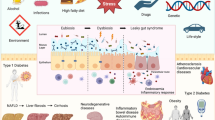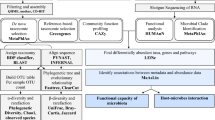Abstract
The fundamental elucidation of how environmental influences provoke the initiation of disease as well as flares of inflammatory bowel disease (IBD) remains incomplete. The current understanding of these diseases suggests that ulcerative colitis (UC) and Crohn’s disease (CD) result from poorly defined interactions between genetic and environmental factors which culminate in the pathologic effects and clinical manifestations of these diseases. The genetic variant appears not sufficient itself to lead to the development of the clinical disease, but likely must combine with the environmental factors. The intestinal microbiome is pivotal to IBD development. A greater understanding of the contribution of these factors to dysbiosis is critical, and we aspire to restoring a healthy microbiome to treat flares and ideally prevent the development of IBD and its complications. This article aims to place the environmental influences in the context of their potential contribution to the development of the pathophysiology of IBD.
Similar content being viewed by others
References
Kabi A et al. Digesting the genetics of inflammatory bowel disease: insights from studies of autophagy risk genes. Inflamm Bowel Dis. 2012;18(4):782–92.
Kaser A, Zeissig S, Blumberg RS. Inflammatory bowel disease. Annu Rev Immunol. 2010;28:573–621.
Baumgart DC, Carding SR. Inflammatory bowel disease: cause and immunobiology. Lancet. 2007;369(9573):1627–40.
Xavier RJ, Podolsky DK. Unravelling the pathogenesis of inflammatory bowel disease. Nature. 2007;448(7152):427–34.
Jostins L et al. Host-microbe interactions have shaped the genetic architecture of inflammatory bowel disease. Nature. 2012;491(7422):119–24.
Arimura Y, et al Characteristics of Japanese inflammatory bowel disease susceptibility loci. J Gastroenterol. 2013. doi:10.1007/s00535-013-0866-2.
Mahurkar S et al. Common variants in NOD2 and IL23R are not associated with inflammatory bowel disease in Indians. J Gastroenterol Hepatol. 2011;26(4):694–9.
Strachan DP. Hay fever, hygiene, and household size. BMJ. 1989;299(6710):1259–60.
Forbes A, Kalantzis T. Crohn’s disease: the cold chain hypothesis. Int J Color Dis. 2006;21(5):399–401.
Funkhouser LJ, Bordenstein SR. Mom knows best: the universality of maternal microbial transmission. PLoS Biol. 2013;11(8):e1001631.
Dominguez-Bello MG et al. Delivery mode shapes the acquisition and structure of the initial microbiota across multiple body habitats in newborns. Proc Natl Acad Sci U S A. 2010;107(26):11971–5.
Bager P et al. Cesarean section and offspring’s risk of inflammatory bowel disease: a national cohort study. Inflamm Bowel Dis. 2012;18(5):857–62.
Sonntag B et al. Preterm birth but not mode of delivery is associated with an increased risk of developing inflammatory bowel disease later in life. Inflamm Bowel Dis. 2007;13(11):1385–90.
Cabrera-Rubio R et al. The human milk microbiome changes over lactation and is shaped by maternal weight and mode of delivery. Am J Clin Nutr. 2012;96(3):544–51.
Khalili H et al. Early life factors and risk of inflammatory bowel disease in adulthood. Inflamm Bowel Dis. 2013;19(3):542–7.
Spooren CE et al. Review article: the association of diet with onset and relapse in patients with inflammatory bowel disease. Aliment Pharmacol Ther. 2013;38(10):1172–87.
Castiglione F et al. Risk factors for inflammatory bowel diseases according to the “hygiene hypothesis”: a case-control, multi-centre, prospective study in Southern Italy. J Crohn’s Colitis. 2012;6(3):324–9.
Roberts CL et al. Translocation of Crohn’s disease Escherichia coli across M-cells: contrasting effects of soluble plant fibres and emulsifiers. Gut. 2010;59(10):1331–9.
Maslowski KM, Mackay CR. Diet, gut microbiota and immune responses. Nat Immunol. 2011;12(1):5–9.
Jakobsen C et al. Environmental factors and risk of developing paediatric inflammatory bowel disease—a population based study 2007–2009. J Crohn’s Colitis. 2013;7(1):79–88.
Ananthakrishnan AN et al. A prospective study of long-term intake of dietary fiber and risk of Crohn’s disease and ulcerative colitis. Gastroenterology. 2013;145(5):970–7.
Tsiountsioura M, et al Detailed assessment of nutritional status and eating patterns in children with gastrointestinal diseases attending an outpatients clinic and contemporary healthy controls. Eur J Clin Nutr. 2014;68(6):700–6.
Burisch J, et al Environmental factors in a population-based inception cohort of inflammatory bowel disease patients in Europe—an ECCO-EpiCom study. J Crohns Colitis. 2014;8(7):607–16.
Palmblad J, Gyllenhammar H. Effect of dietary lipids on immunity and inflammation. Review article. APMIS. 1988;96(7):571–83.
Costea I et al. Interactions between the dietary polyunsaturated fatty acid ratio and genetic factors determine susceptibility to pediatric Crohn’s disease. Gastroenterology. 2014;146(4):929–31.
Laing B, Han DY, Ferguson LR. Candidate genes involved in beneficial or adverse responses to commonly eaten brassica vegetables in a New Zealand Crohn’s disease cohort. Nutrient. 2013;5(12):5046–64.
Vind I et al. Increasing incidences of inflammatory bowel disease and decreasing surgery rates in Copenhagen City and County, 2003–2005: a population-based study from the Danish Crohn colitis database. Am J Gastroenterol. 2006;101(6):1274–82.
Benchimol EI et al. Increasing incidence of paediatric inflammatory bowel disease in Ontario, Canada: evidence from health administrative data. Gut. 2009;58(11):1490–7.
Khalili H et al. Geographical variation and incidence of inflammatory bowel disease among US women. Gut. 2012;61(12):1686–92.
Wang TT et al. Direct and indirect induction by 1,25-dihydroxyvitamin D3 of the NOD2/CARD15-defensin beta2 innate immune pathway defective in Crohn disease. J Biol Chem. 2010;285(4):2227–31.
Ooi JH et al. Vitamin D regulates the gut microbiome and protects mice from dextran sodium sulfate-induced colitis. J Nutr. 2013;143(10):1679–86.
Baumgart M et al. Culture independent analysis of ileal mucosa reveals a selective increase in invasive Escherichia coli of novel phylogeny relative to depletion of Clostridiales in Crohn’s disease involving the ileum. ISME J. 2007;1(5):403–18.
Barnich N et al. CEACAM6 acts as a receptor for adherent-invasive E. coli, supporting ileal mucosa colonization in Crohn disease. J Clin Invest. 2007;117(6):1566–74.
Martinez-Medina M et al. Western diet induces dysbiosis with increased E coli in CEABAC10 mice, alters host barrier function favouring AIEC colonisation. Gut. 2014;63(1):116–24.
Leigh RJ, Turnberg LA. BCG vaccination and Crohn’s disease. Dig Dis Sci. 1980;25(12):972.
Gilat T et al. Childhood factors in ulcerative colitis and Crohn’s disease. An international cooperative study. Scand J Gastroenterol. 1987;22(8):1009–24.
Baron S et al. Environmental risk factors in paediatric inflammatory bowel diseases: a population based case control study. Gut. 2005;54(3):357–63.
Hansen TS et al. Environmental factors in inflammatory bowel disease: a case-control study based on a Danish inception cohort. J Crohn’s Colitis. 2011;5(6):577–84.
Virta L et al. Association of repeated exposure to antibiotics with the development of pediatric Crohn’s disease—a nationwide, register-based Finnish case–control study. Am J Epidemiol. 2012;175(8):775–84.
Marchant A et al. Newborns develop a Th1-type immune response to Mycobacterium bovis bacillus Calmette-Guerin vaccination. J Immunol. 1999;163(4):2249–55.
Ennis FA et al. Primary induction of human CD8+ cytotoxic T lymphocytes and interferon-gamma-producing T cells after smallpox vaccination. J Infect Dis. 2002;185(11):1657–9.
Villumsen M et al. Risk of inflammatory bowel disease following Bacille Calmette-Guerin and smallpox vaccination: a population-based Danish case-cohort study. Inflamm Bowel Dis. 2013;19(8):1717–24.
Ng SC et al. Role of genetic and environmental factors in British twins with inflammatory bowel disease. Inflamm Bowel Dis. 2012;18(4):725–36.
Van Kruiningen HJ, Freda BJ. A clustering of Crohn’s disease in Mankato, Minnesota. Inflamm Bowel Dis. 2001;7(1):27–33.
Pierce ES, Borowitz SM, Naser SA. The Broad Street pump revisited: dairy farms and an ongoing outbreak of inflammatory bowel disease in Forest, Virginia. Gut Pathog. 2011;3(1):20.
Pierce ES. Free-ranging Rocky Mountain bighorn sheep and an outbreak of inflammatory bowel disease along the Clark Fork River in Plains, Montana. Virulence. 2012;3(6):546–50.
Masclee GM et al. Is Clostridium difficile associated with relapse of inflammatory bowel disease? Results from a retrospective and prospective cohort study in the Netherlands. Inflamm Bowel Dis. 2013;19(10):2125–31.
Ananthakrishnan AN et al. Aspirin, nonsteroidal anti-inflammatory drug use, and risk for Crohn disease and ulcerative colitis: a cohort study. Ann Intern Med. 2012;156(5):350–9.
Musumba C, Pritchard DM, Pirmohamed M. Review article: cellular and molecular mechanisms of NSAID-induced peptic ulcers. Aliment Pharmacol Ther. 2009;30(6):517–31.
Jenkins AP et al. Do non-steroidal anti-inflammatory drugs increase colonic permeability? Gut. 1991;32(1):66–9.
Etminan M et al. Isotretinoin and risk for inflammatory bowel disease: a nested case-control study and meta-analysis of published and unpublished data. JAMA Dermatol. 2013;149(2):216–20.
Looijer-van Langen M et al. Estrogen receptor-beta signaling modulates epithelial barrier function. Am J Physiol Gastrointest Liver Physiol. 2011;300(4):G621–6.
Khalili H et al. Hormone therapy increases risk of ulcerative colitis but not Crohn’s disease. Gastroenterology. 2012;143(5):1199–206.
Khalili H et al. Oral contraceptives, reproductive factors and risk of inflammatory bowel disease. Gut. 2013;62(8):1153–9.
Higuchi LM et al. A prospective study of cigarette smoking and the risk of inflammatory bowel disease in women. Am J Gastroenterol. 2012;107(9):1399–406.
Biedermann L et al. Smoking cessation induces profound changes in the composition of the intestinal microbiota in humans. PLoS One. 2013;8(3):e59260.
Verschuere S et al. Cigarette smoke and the terminal ileum: increased autophagy in murine follicle-associated epithelium and Peyer’s patches. Histochem Cell Biol. 2012;137(3):293–301.
He C et al. Exercise-induced BCL2-regulated autophagy is required for muscle glucose homeostasis. Nature. 2012;481(7382):511–5.
Khalili H et al. Physical activity and risk of inflammatory bowel disease: prospective study from the Nurses’ Health Study cohorts. BMJ. 2013;347:f6633.
Lange T, Dimitrov S, Born J. Effects of sleep and circadian rhythm on the human immune system. Ann N Y Acad Sci. 2010;1193:48–59.
Uthgenannt D et al. Effects of sleep on the production of cytokines in humans. Psychosom Med. 1995;57(2):97–104.
Swanson GR, Burgess HJ, Keshavarzian A. Sleep disturbances and inflammatory bowel disease: a potential trigger for disease flare? Expert Rev Clin Immunol. 2011;7(1):29–36.
Ranjbaran Z et al. The relevance of sleep abnormalities to chronic inflammatory conditions. Inflamm Res. 2007;56(2):51–7.
Opp MR. Cytokines and sleep. Sleep Med Rev. 2005;9(5):355–64.
Ananthakrishnan AN et al. Sleep disturbance and risk of active disease in patients with Crohn’s disease and ulcerative colitis. Clin Gastroenterol Hepatol. 2013;11(8):965–71.
Ali T et al. Assessment of the relationship between quality of sleep and disease activity in inflammatory bowel disease patients. Inflamm Bowel Dis. 2013;19(11):2440–3.
Mawdsley JE, Rampton DS. The role of psychological stress in inflammatory bowel disease. Neuroimmunomodulation. 2006;13(5–6):327–36.
Rampton DS. The influence of stress on the development and severity of immune-mediated diseases. J Rheumatol Suppl. 2011;88:43–7.
Ananthakrishnan AN et al. Association between depressive symptoms and incidence of Crohn’s disease and ulcerative colitis: results from the Nurses’ Health Study. Clin Gastroenterol Hepatol. 2013;11(1):57–62.
Langhorst J et al. Short-term stress, but not mucosal healing nor depression was predictive for the risk of relapse in patients with ulcerative colitis: a prospective 12-month follow-up study. Inflamm Bowel Dis. 2013;19(11):2380–6.
Vanuytsel T, et al Psychological stress and corticotropin-releasing hormone increase intestinal permeability in humans by a mast cell-dependent mechanism. Gut. 2014;63(8):1293–9.
Martin Sanchez F, et al, Exposome informatics: considerations for the design of future biomedical research information systems. J Am Med Inform Assoc. 2014;21(3):386–90.
Tringe SG, Rubin EM. Metagenomics: DNA sequencing of environmental samples. Nat Rev Genet. 2005;6(11):805–14.
Gerber GK, Onderdonk AB, Bry L. Inferring dynamic signatures of microbes in complex host ecosystems. PLoS Comput Biol. 2012;8(8):e1002624.
Nes AA, et al Web-based, self-management enhancing interventions with e-diaries and personalized feedback for persons with chronic illness: a tale of three studies. Patient Educ Couns. 2013;93(3):451–8.
Compliance with Ethics Guidelines
Conflict of Interest
Aoibhliin O’Toole declares no conflict of interest. Joshua Korzenik has served as an IBD consultant for Abbvie, Empiramed, Pfizer, Vithera, Prometheus, and Janssen; he has received research/grant support from Abbvie, and Warner-Chilcott and has served as a member of the Data Safety Monitoring Board for Roche.
Human and Animal Rights and Informed Consent
This article does not contain any studies with human or animal subjects performed by any of the authors.
Author information
Authors and Affiliations
Corresponding author
Additional information
This article is part of the Topical Collection on Inflammatory Bowel Disease
Rights and permissions
About this article
Cite this article
O’Toole, A., Korzenik, J. Environmental Triggers for IBD. Curr Gastroenterol Rep 16, 396 (2014). https://doi.org/10.1007/s11894-014-0396-y
Published:
DOI: https://doi.org/10.1007/s11894-014-0396-y




